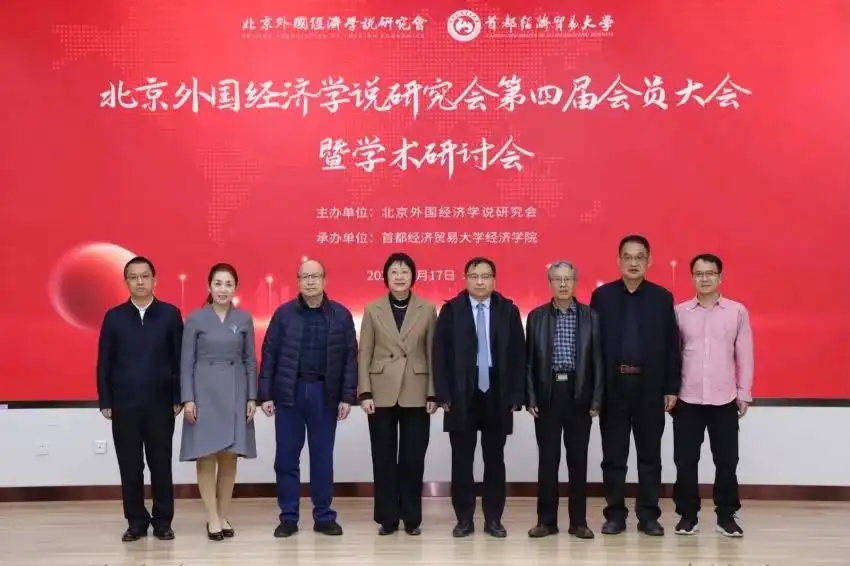Research on Economic Theory and Practical Issues under the New Scientific and Technological Revolution
■China Economic Times reporter Liu Hui
** **
On March 17, the 4th General Conference and Academic Seminar of the Beijing Association for Foreign Economic Theory was held in Beijing. Su Jian, President of the 4th Council of the Beijing Association for Foreign Economic Theory, and Chen Yanbin, Vice President of the Capital University of Economics and Business, delivered speeches at the meeting. Experts and scholars such as Peking University, Capital University of Economics and Business, and Huaxia Institute of New Supply Economics conducted discussions on "Research on Economic Theory and Practical Issues under the New Scientific and Technological Revolution."

Su Jian said that recently, Musk's launch of a starship has attracted global attention, and progress has been made in the fields of artificial intelligence, new energy, and 6G. This long cycle is significantly different from previous cycles. Humanity is about to enter a new era of artificial intelligence and a new space age. It will be unprecedented in terms of expanding the territory of human activities and expanding the limits of human intelligence and physical strength. How to understand and respond to such a scientific and technological revolution has become a major theoretical and practical issue facing China at present.
Chen Yanbin said that in the current era of new scientific and technological revolution, cutting-edge technologies such as artificial intelligence and big data are constantly emerging, affecting economic models, lifestyles and social structures. He introduced the newly established Institute of Digital Economics at Capital University of Economics and Business, and called on everyone to study the needs of Western economics to refine Chinese theories.
Economist Teng Tai said that the largest wealth giant in the world today is not a producer of material wealth, but a producer of information wealth. This brings challenges to traditional economics, which is reflected in the fact that theories such as production and distribution cannot well explain the digital economy. cycle. He proposed soft value economics, which used characteristics such as innovation functions and production uncertainty to characterize soft value and hard value, and demonstrated the use of this analytical framework to explain current economic phenomena.
Huang Jianhui, vice president of the China Private Enterprise Research Association and chief economist of the China Institute of New Supply Economics, said that from 2025 to 2035, the key areas for the development of China's real economy are "digitalization + carbon neutrality + artificial intelligence" and "new energy + New materials + intelligent manufacturing + general health", we should promote the construction of a market-oriented and innovative government and build a high-quality business environment that is in line with international standards.
Wu Hanhong, a professor at Renmin University of China, believes that anti-monopoly policy is a game between the government and business entities; policies face the trade-off between rules and discretionary decision-making, and are implemented by relevant government personnel, which is severe and loose; the government's policies and credibility are important to Anti-monopoly policies. It is crucial; anticipatory management can affect the implementation effect of anti-monopoly policies.
Yang Chunxue, a professor at the Capital University of Economics and Business, encourages Chinese economists to tell Chinese stories, put forward Chinese propositions, use stories to tell new ideas, and theorize new ideas to establish an academic system of China's independent intellectual property rights.
Xia Qingjie, a professor at Peking University, believes that compared with his early years, the return of high-level education in recent years is much higher than that of middle-level education. He attributed this phenomenon to the rise of Chinese high-tech companies and the employment of large numbers of higher-educated employees. "From this perspective, our country is basically out of the middle-income trap because China has greater innovation potential."
Zhang Wei, a professor at China University of Political Science and Law, said that in recent years, the government has introduced many policies for the digital transformation of enterprises, but whether the policy goals are achieved remains to be studied. "We must pay attention to the cultivation of scientific and technological talents, strengthen top-level design, and create a good transformation institutional environment for enterprises."
Jia Lijun, a professor at Beijing Institute of Technology, said that after entering the digital era, the R & D activities of developed capitalist countries have undergone profound changes, which is reflected in the extensive and in-depth application of digital technology in R & D activities, which has led to the integration of scientific research and process development, and further led to knowledge products. Major changes have taken place in the type and structure of products. China should strengthen the development and policy support of industrial software, comprehensively strengthen the protection of intellectual property rights, and participate in the formulation of international technical standards.
Zhang Dongmei, a professor at the Central University for Nationalities, said that green credit policies have a positive impact on corporate green technology innovation, and the effect is achieved by alleviating corporate financing constraints; a symmetrical information transmission mechanism should be established to develop differentiated green credit products to meet different types of enterprises. differentiated needs.
